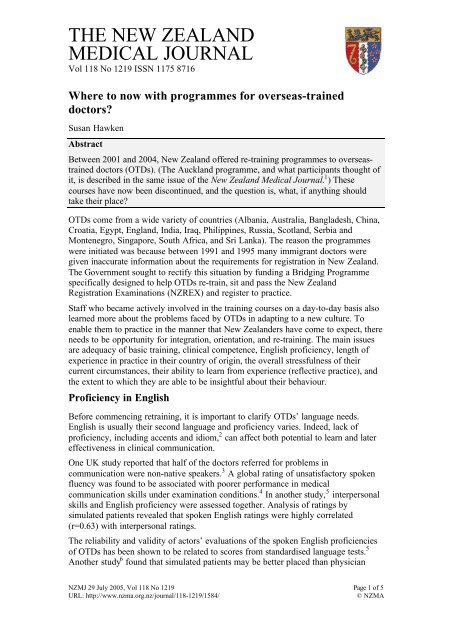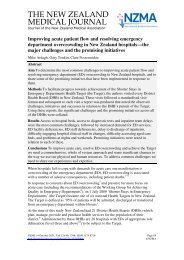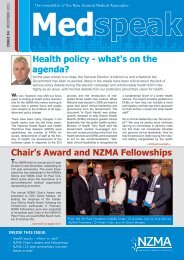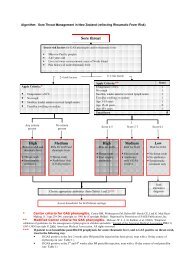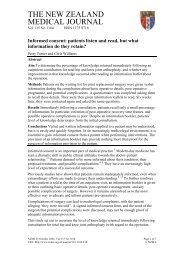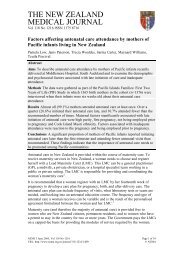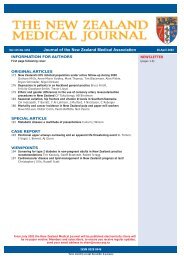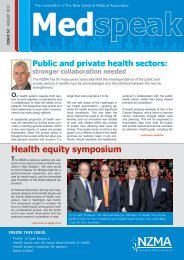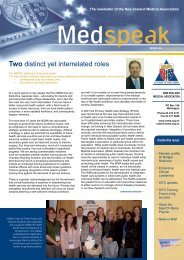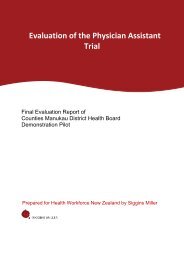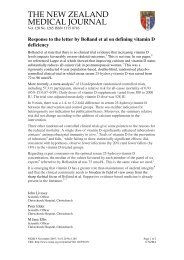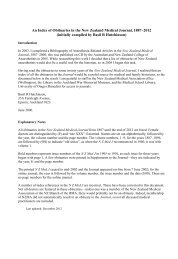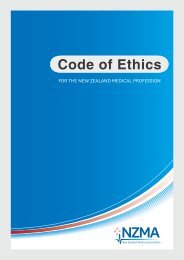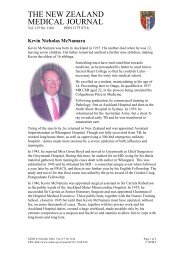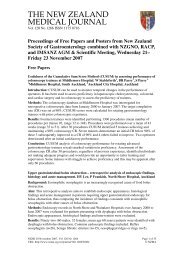THE NEW ZEALAND MEDICAL JOURNAL
THE NEW ZEALAND MEDICAL JOURNAL
THE NEW ZEALAND MEDICAL JOURNAL
Create successful ePaper yourself
Turn your PDF publications into a flip-book with our unique Google optimized e-Paper software.
<strong>THE</strong> <strong>NEW</strong> <strong>ZEALAND</strong><br />
<strong>MEDICAL</strong> <strong>JOURNAL</strong><br />
Vol 118 No 1219 ISSN 1175 8716<br />
Where to now with programmes for overseas-trained<br />
doctors<br />
Susan Hawken<br />
Abstract<br />
Between 2001 and 2004, New Zealand offered re-training programmes to overseastrained<br />
doctors (OTDs). (The Auckland programme, and what participants thought of<br />
it, is described in the same issue of the New Zealand Medical Journal. 1 ) These<br />
courses have now been discontinued, and the question is, what, if anything should<br />
take their place<br />
OTDs come from a wide variety of countries (Albania, Australia, Bangladesh, China,<br />
Croatia, Egypt, England, India, Iraq, Philippines, Russia, Scotland, Serbia and<br />
Montenegro, Singapore, South Africa, and Sri Lanka). The reason the programmes<br />
were initiated was because between 1991 and 1995 many immigrant doctors were<br />
given inaccurate information about the requirements for registration in New Zealand.<br />
The Government sought to rectify this situation by funding a Bridging Programme<br />
specifically designed to help OTDs re-train, sit and pass the New Zealand<br />
Registration Examinations (NZREX) and register to practice.<br />
Staff who became actively involved in the training courses on a day-to-day basis also<br />
learned more about the problems faced by OTDs in adapting to a new culture. To<br />
enable them to practice in the manner that New Zealanders have come to expect, there<br />
needs to be opportunity for integration, orientation, and re-training. The main issues<br />
are adequacy of basic training, clinical competence, English proficiency, length of<br />
experience in practice in their country of origin, the overall stressfulness of their<br />
current circumstances, their ability to learn from experience (reflective practice), and<br />
the extent to which they are able to be insightful about their behaviour.<br />
Proficiency in English<br />
Before commencing retraining, it is important to clarify OTDs’ language needs.<br />
English is usually their second language and proficiency varies. Indeed, lack of<br />
proficiency, including accents and idiom, 2 can affect both potential to learn and later<br />
effectiveness in clinical communication.<br />
One UK study reported that half of the doctors referred for problems in<br />
communication were non-native speakers. 3 A global rating of unsatisfactory spoken<br />
fluency was found to be associated with poorer performance in medical<br />
communication skills under examination conditions. 4 In another study, 5 interpersonal<br />
skills and English proficiency were assessed together. Analysis of ratings by<br />
simulated patients revealed that spoken English ratings were highly correlated<br />
(r=0.63) with interpersonal ratings.<br />
The reliability and validity of actors’ evaluations of the spoken English proficiencies<br />
of OTDs has been shown to be related to scores from standardised language tests. 5<br />
Another study 6 found that simulated patients may be better placed than physician<br />
NZMJ 29 July 2005, Vol 118 No 1219 Page 1 of 5<br />
URL: http://www.nzma.org.nz/journal/118-1219/1584/<br />
© NZMA
examiners to provide valid assessment of OTDs English proficiency. This idea was<br />
successfully implemented in the Auckland programme. The actors (as simulated<br />
patients) were comfortable with indicating (on a scale) how easy it was to understand<br />
the OTD’s English within the consultation.<br />
Doctors need a high degree of proficiency in the language being used by their<br />
patients, as local colloquial terms and cultural nuances are used frequently in<br />
conveying meaning in the consultation. 7 It is important, therefore, to assess OTDs’<br />
proficiency and to provide language training where necessary. Indeed, proficiency in<br />
the language is essential to maximising the effectiveness of clinical communication<br />
and preventing poor outcomes and complaints.<br />
Minimising failure<br />
To maximise the potential gain from retraining courses, there should be careful<br />
selection of participants. Combining an intensive bridging course with the challenge<br />
of learning a whole new way of consulting with patients can mean that OTDs are<br />
overwhelmed by the demands of the course, especially considering the other possible<br />
stressors in their lives such as health concerns, financial strain, family commitments,<br />
and adaptation to a new culture.<br />
There have been few reported studies on the issue of adjusting curricula to facilitate<br />
OTDs’ adaptation to new situations. 8 Yet, since studies (in other settings) have shown<br />
that stress, depression and financial strain can affect motivation, it is not surprising<br />
that one study found that OTDs showed a deterioration in mental health as evidenced<br />
by their scores on the General Health Questionnaire. 9 Attention also needs to be paid<br />
to personal loss and life-cycle considerations for the OTD. 8<br />
Researchers in Australia have reported that long-term unemployment and culture<br />
shock have adverse effects on OTDs’ mental and physical health, leading to poor<br />
general well-being and psychosomatic symptoms; and that OTDs also experienced<br />
alienation and anger when attempting to enter the Australian workforce. 10<br />
An OTD’s potential to learn and adapt to a changing clinical environment may be<br />
influenced by previous learning, and the length and depth of experience in practice in<br />
their country of origin. As the overseas-trained doctor is relearning a different style of<br />
medicine (e.g. being more patient-centred), a significant identity change may be<br />
required. Changes in those who have been in clinical practice for some time, it is<br />
postulated, are rare since little ‘learning-to-learn’ takes place after formal medical<br />
training is complete. 11 It follows that for the older overseas-trained doctor it will be<br />
hard to change what he/she has learnt, especially since formal medical training was<br />
more likely to have been traditional didactic teaching, with less emphasis on selfdirected<br />
learning, problem-solving, or self-reflection. This can be a barrier to the<br />
older, more experienced OTDs learning and changing their professional behaviour.<br />
When the profession investigates a report of poor practice, it is not uncommon to find<br />
that the doctor is professionally isolated and appears to be unaware of his or her poor<br />
performance. 12,13 Reflectiveness is therefore seen as a key skill for health<br />
professionals working in clinical practice. It is critical that doctors have the skills to<br />
recognise their own strengths and weaknesses; they also need to be committed to selfdirected<br />
learning in order to maintain competence. A range of factors may trigger or<br />
contribute to insight, including observing others consulting, undertaking case review,<br />
NZMJ 29 July 2005, Vol 118 No 1219 Page 2 of 5<br />
URL: http://www.nzma.org.nz/journal/118-1219/1584/<br />
© NZMA
the degree of internal or external motivation, and the visibility of professional practice<br />
norms. 14<br />
Being a reflective practitioner also infers having the capacity to change. This requires<br />
not only accurate insight, but also motivation to improve. There is no doubt that<br />
OTDs are highly motivated as they have emigrated in the hope of a better life and<br />
have undertaken the Bridging Programme to prepare for NZREX. Yet when it came to<br />
supporting the usefulness of belonging to a peer group, some participants were<br />
unconvinced. 1 This could be because it was still a new concept and they could not yet<br />
see its value, or that it was uncomfortable and challenging for them, or that this<br />
component was inadequate for their needs.<br />
Some participants stated that they were more comfortable and confident working<br />
alone. In our experience, a small minority of participants lacked insight into their<br />
performance and hence were unable to take advantage of the intensive tuition in<br />
Professional Development provided by the Bridging Programme. As a result, they<br />
could not meet the standards required to pass.<br />
Training modules<br />
An important recommendation, arising from our experience in teaching OTDs, is that<br />
we design a system of re-training that takes into account the vastly different<br />
backgrounds and training requirements of immigrant doctors.<br />
Specifically, a system of modules could be developed that meets individual OTDs’<br />
needs. For example, almost all OTDs would require a module on Maori and Pacific<br />
health, and another on the ethical and legal environment in New Zealand. Many<br />
would need modules on the patient-centred style of consultation; some may need<br />
updates in particular specialty areas (e.g. paediatrics or obstetrics & gynaecology);<br />
while some may need only an orientation programme informing them about the<br />
New Zealand health system.<br />
A module-based programme would need additional work in the planning stage,<br />
especially in designing the more specialised modules. It might also be a little more<br />
complex to administer; but it might be well worth it in the long run.<br />
The way ahead<br />
It is clear, both from our own experience and from current research, that there needs<br />
to be a fuller assessment of OTDs’ learning needs 15 before they enter a re-training<br />
programme. For example, there needs to be a measure of English proficiency, set at a<br />
standard higher than it is currently, and appropriate to the medical setting.<br />
There is also a need to recruit the most appropriate candidates. It might be advisable<br />
to develop special tools to screen for those doctors best able to make the changes in<br />
behaviour required to practice in New Zealand. To this end, the Medical Council of<br />
New Zealand might consider developing a diagnostic interview, covering all aspects<br />
of the requirements for registration and practice in New Zealand. This would be a<br />
challenge. In addition to the established measures of clinical competence, it would be<br />
advantageous to have specific tools for measuring motivation, mood, learning<br />
behaviours and awareness of what others think. 14 We should also try to include a<br />
measure of capacity to change.<br />
NZMJ 29 July 2005, Vol 118 No 1219 Page 3 of 5<br />
URL: http://www.nzma.org.nz/journal/118-1219/1584/<br />
© NZMA
When candidates’ needs have been carefully assessed, they could then be allocated to<br />
one or more of a series of specially designed modules, according to each individual’s<br />
skills and capabilities. 16 This would provide the framework for completion of the<br />
requirements for sitting NZREX and, if successful, registration to practice in<br />
New Zealand.<br />
The wealth of both professional and personal experience that OTDs bring to New<br />
Zealand needs to be recognised and valued. They all have their own special<br />
contributions to make. We need to create a system that ensures their needs for reeducation,<br />
continuing training, and permanent employment are enhanced. If New<br />
Zealand is to look after its multicultural population adequately, it will be to<br />
everyone’s advantage to have well-trained doctors from a variety of different cultural<br />
backgrounds.<br />
Author information: Susan J Hawken, Senior Lecturer, Department of Psychological<br />
Medicine, University of Auckland, Auckland<br />
Correspondence: Dr Susan Hawken, Senior Lecturer, Department of Psychological<br />
Medicine , Faculty of Medical and Health Sciences, University of Auckland, Private<br />
Bag 92019, Auckland. Fax: (09) 373 7013; email: s.hawken@auckland.ac.nz<br />
References:<br />
1. Hawken SJ. Overseas-trained doctors' evaluation of a New Zealand course in professional<br />
development. N Z Med J. 2005;118(1219). URL: http://www.nzma.org.nz/journal/118-<br />
1219/1584<br />
2. Kidd MR, Zulman A. Educational support for overseas-trained doctors. Med J Aust.<br />
1994;160:73–5.<br />
3. Skelton JR, Kai J, Loudon RF. Cross-cultural communication in medicine: questions for<br />
educators. Med Educ 2001;35:257–61.<br />
4. Chur-Hansen A, Vernon-Roberts J, Clark S. Language background, English language<br />
proficiency and medical communication skills of medical students. Med Educ. 1997;31:259–<br />
63.<br />
5. Boulet JR, van Zanten M, McKinley DW, Gary NE. Evaluating the spoken English<br />
proficiency of graduates of foreign medical schools. Med Educ. 2001;35:767–73.<br />
6. Rothman AI, Cusimano M. Assessment of English proficiency in international medical<br />
graduates by physician examiners and standardized patients. Med Educ. 2001;35:762–6.<br />
7. Chur-Hansen A, Barrett RJ. Teaching colloquial Australian English to medical students from<br />
non-English speaking backgrounds. Med Educ. 1996;30:412–7.<br />
8. Cole-Kelly K. Cultures engaging cultures: International medical graduates training in the<br />
United States. Fam Med. 1994;26:618–24.<br />
9. North N, Trlin A, Singh R. Characteristics and difficulties of unregistered doctors in New<br />
Zealand. N Z Popul Rev. 1999;25:133–43.<br />
10. Sullivan EA, Willcock S, Ardzejewska K, Slaytor EK. A pre-employment programme for<br />
overseas-trained doctors entering the Australian workforce, 1997-99. Med Educ.<br />
2002;36:614–21.<br />
11. Slotnick HB. How doctors know when to stop learning. Med Teach. 2000;22:189–96.<br />
12. Southgate L, Campbell M, Cox J, et al. The General Medical Council's Performance<br />
Procedures: the development and implementation of tests of competence with examples from<br />
general practice. Med Educ. 2001;35:20–8.<br />
NZMJ 29 July 2005, Vol 118 No 1219 Page 4 of 5<br />
URL: http://www.nzma.org.nz/journal/118-1219/1584/<br />
© NZMA
13. Bahrami J, Evans A. Underperforming doctors in general practice: a survey of referrals to UK<br />
Deaneries. Br J Gen Pract. 2001;51:892–6.<br />
14. Hays RB, Jolly BC, Caldon LJ, et al. Is insight important measuring capacity to change<br />
performance. Med Educ. 2002;36:965–71.<br />
15. Romem Y, Benor DE. Training immigrant doctors: issues and responses. Med Educ.<br />
1993;27:74–82.<br />
16. Maymon R, Phillip M. Tel Aviv University postgraduate training program for overseas<br />
physicians: a decade of experience, 1989-99. Isr Med Assoc J. 2000;2:635–9.<br />
NZMJ 29 July 2005, Vol 118 No 1219 Page 5 of 5<br />
URL: http://www.nzma.org.nz/journal/118-1219/1584/<br />
© NZMA


